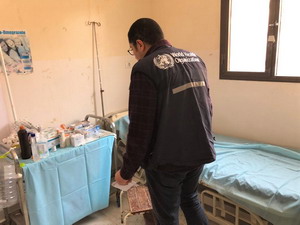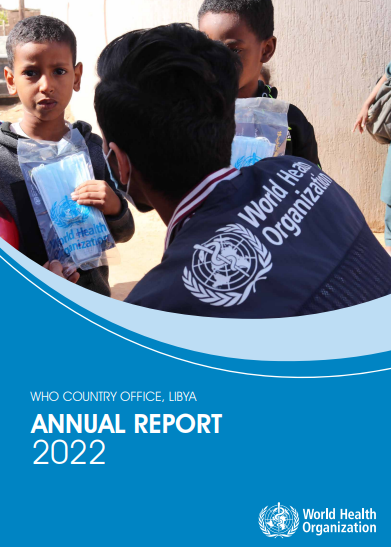 Dr Mohamed Hashem of WHO Libya assesses the needs of a health facility that will serve displaced familiesTripoli, April 29, 2019--As residents of Libya’s war-torn capital fled bombings in their neighbourhoods, “they felt their blood pressure was raised because of the stress, the sound of the rockets and gunfire,” says Mohamed Hashem, a WHO doctor in Tripoli. When they arrived at temporary centres for displaced people, “They asked me to check their blood pressure, their sugar levels,” he says.
Dr Mohamed Hashem of WHO Libya assesses the needs of a health facility that will serve displaced familiesTripoli, April 29, 2019--As residents of Libya’s war-torn capital fled bombings in their neighbourhoods, “they felt their blood pressure was raised because of the stress, the sound of the rockets and gunfire,” says Mohamed Hashem, a WHO doctor in Tripoli. When they arrived at temporary centres for displaced people, “They asked me to check their blood pressure, their sugar levels,” he says.
Dr Hashem is one of many aid workers serving more than 40 000 people who have fled their homes since violence erupted in early April in Tripoli. While the majority of families are staying with relatives, others are staying in temporary shelters. “These are old schools or old apartment buildings that had been closed,” says Dr Hashem. “They are not meant to be a place of residence.” One school he visited was housing more than 20 families—almost 100 people.
Both in his WHO role and also in his spare time, Dr Hashem visits the centres for internally displaced people (IDPs). “There’s a centre less than a kilometre from where I live, so I go to check on them,” he says. Dr Hashem also assesses pressing needs of the health facilities near the IDP centres, knowing that these will receive more patients.
He and other WHO staff check stocks of medicines and other resources so that WHO can help equip the facilities to handle larger caseloads. “Some laboratory materials are running short, like reagents to do blood tests,” he says.
Dr Osama Sharif, another WHO doctor in Tripoli, agrees. “Some people went to shelters without carrying their medications,” he notes. “We are trying to fill all the gaps, so they don’t suffer a shortage of supplies.”
Families have food, shelter and water in the IDP centres, but their lives are indefinitely on hold as the conflict drags on. “They sit there all day. They cannot go to their work because their work is in the conflict area,” says Hashem. “When donations come, they unload the food…People are frustrated.”
They also have health concerns. “People are scared about possible outbreak of infectious diseases,” says Hashem.
Dr Sharif says that one key goal for WHO is preventing the spread of diseases, like acute watery diarrhoea, for people in close quarters. There are also concerns about the spread of vaccine-preventable diseases, especially if vaccination schedules were interrupted when families fled with their children. “Since they were displaced from their homes and live in collective shelters, children of displaced families are susceptible to infectious diseases due to weak immunity,” says Dr Sharif. “WHO is in coordination with the National Center for Disease Control and UNICEF to ensure all displaced children are vaccinated against killer diseases.”
As WHO works to allay fears and buttress Libya’s already-weakened health system, the spectre of a protracted crisis in Tripoli looms. “The situation of IDPs is bad and they need a lot of support,” says Sharif, who sees their discouragement and fear. “We also try to talk to them, improve their mood.”
In addition to helping families in IDP centres, “We need to support families who are hosting relatives,” says Hashem. While extended families want to offer hospitality, their resources may be stretched as time goes on.
“What concerns me is--how long will this last? How long will communities and aid organizations support them?” says Hashem. “People are excited to support each other at first…but it’s not clear if they’ll go home.”





 Libya country office annual report, 2022
Libya country office annual report, 2022
